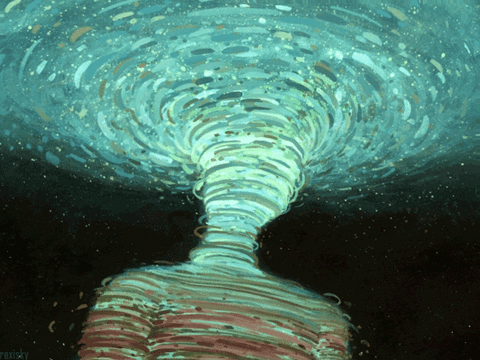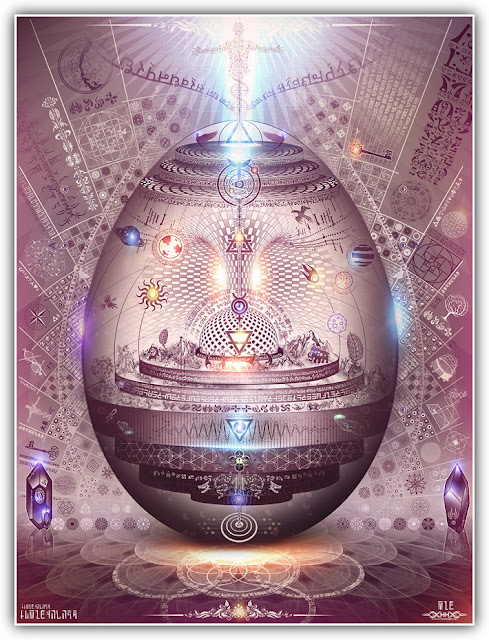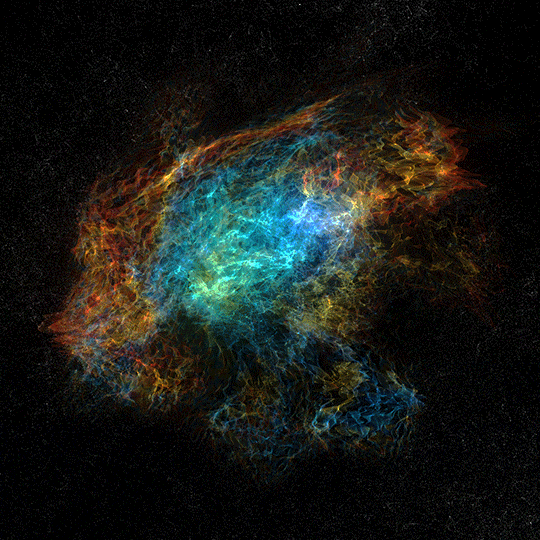Cosmogony
Vision
Pérəma Déiwja (Óljamma in her transcendent aspect) lay in tranquil meditation in the field of eternity, when a vision gradually appeared to her of a magnificent cosmic tree, emerging confidently from a ground of being and rising high into a great void. She marveled at the awesome and terrible beauty of the vision, its aesthetic form, its towering scale, its perfect integration amid staggering complexity, and its phenomenal diversity. She reflected on the nature of its shattered unity. She discerned an immense number of individual creatures within the vision, each with its own discrete conscious experience. The creatures included both mortals and gods. The mortals in the vision knew joy, but also suffering and decrepitude, and they experienced the terrifying illusion of death. Even the gods, though individually immortal, nevertheless suffered therein. She imagined how it might be, obliged to experience mere quanta of consciousness in such apparent isolation. Pérəma Déiwja knew profound solitude, yet never solely separation.
As Pérəma Déiwja lay contemplating this vision, she allowed herself to fall into a deep sleep. The epic, wondrous, majestic, terrible, beautiful, magnificent, glorious dream she dreams is the omniverse of reality. The consciousness that is Pérəma Déiwja, in her immanent aspect as Óljamma, pours into her dream through the creation that is the omniverse into the conscious multiverse. Within the multiverse of her dream, she experiences all conscious and unconscious ideas and affects as virtually all of the creatures in her dream do, in discrete isolation. As characters in her dream, we creatures are ourselves dreamers too. The Individual thoughts and feelings of both mortals and gods are all ultimately hers. When we feel devastating sorrow, crushing loneliness, ceaseless misery, blinding terror, or searing agony, she feels it as keenly even as we do. When we know intoxicating joy, soothing comfort, complete serenity, boundless ecstasy, or profound enlightenment, she knows it as deeply as we do. And when these feelings are evoked within us or others, they are evoked in her too.
Creation
In the beginning, from the deep and dark waters of the eternal void, emerged Wástoudn (‘wasteland’). Then, within wasteland, appeared Médhighordhos (‘midrealm’), encircled by the eternal spring waters of Pósticita (‘the afterlife’). None of this was yet fully real. It was only potential, until the final act of creation at the end of time. Out of the early mystery of midrealm, two groups of gods evolved—Mágnos (‘the giants’) and elder Djéwes (‘the celestial gods’). In time, this first generation of gods dwelling beside the waters of the afterlife produced a second generation. The giants gave rise to Anséwes (‘the spiritual gods’), while the elder celestial gods gave rise to the younger celestial gods. This second generation gave rise to a third, which included (ostensible) twins—Ménots (the goddess of the Moon) and Sáwel (the god of the Sun). Each of these principal goddesses and gods was lady or lord to a loyal host of lesser gods and angels.
Now it had been prophesied that one day the act of creating the entire omniverse would take place within every universe inhabited by the gods. The spiritual gods were in favor of creation, while the celestial gods were opposed, and each group bitterly opposed the other. On either side of the disputed territory of midrealm, two opposing kingdoms emerged, each expanding its domain into new territory. The spiritual gods established the kingdom of Prqjótjom (‘purgatory’), while the celestial gods established the kingdom of Kréqa (‘limbo’). The spiritual gods built a castle in purgatory named Prqjótjos Kastérlom (‘the castle of purgatory’), and the celestial gods built a great court in limbo named Kréqas Kómwoirjom (‘the court of limbo’). Tensions increased, and the two sides fought a long and terrible war, known as Dhəmelósjo Dsa [/dhəmɛˈlɔsjɔ ˈtsa/] 🔊 (‘the foundation war’). Finally, at an impasse, both sides sought a truce. The goddess Pltáwija Matér of the spiritual gods and the god Wélnos of the celestial gods each in turn addressed the principals on both sides. Pltáwija Matér spoke passionately in favor of creation and all its glories, so persuasively that the celestial god Djéus Patér and his host changed their allegiance. Afterward, Wélnos spoke passionately against creation and all its miseries, so persuasively that the spiritual goddess Kréuna and her host changed their allegiance. To cement the fragile truce, Pltáwija Matér and Djéus Patér were married and resided in purgatory, and Kréuna and Wélnos were married and resided in limbo. This was known as Déiwom Paks [/ˈdɛɪwom ˈpɑks/] 🔊 (‘the peace of the gods’).
With the intent to facilitate the creation at a later time, Pltáwija Matér and Djéus Patér founded a new region expanding into the highlands above purgatory, and they named this new region Peridhóighos (‘paradise’). They brought most of the spiritual gods and celestial gods with them and declared purgatory and paradise to be parts of a combined region known as Kémelom (‘heaven’). Those souls of the dead who favored creation would undergo trials in purgatory. The first part of purgatory would consist of a recapitulation or review of one’s mortal life as the angelic host studied its own prehistory. The second part would consist of a systematic transformation of one’s soul to achieve perfect love of all life, in preparation for paradise and one’s direct participation in Déiwos. After their trials were complete, those souls would ascend to paradise, dwelling for eons therein while they await the final conflict. At the highest point in paradise, Pltáwija Matér and Djéus Patér built a magnificent citadel, named Peridhóighosjo Altópolis (‘the citadel of paradise’), wherein they dwelt thereafter.
With the intent to prevent the creation at a later time, Kréuna and Wélnos similarly founded a new region expanding into the lowlands beneath limbo, and they named this new region Ndhérom (‘inferno’). They, along with those spiritual gods and celestial gods who had chosen to remain with them, renounced their former identities and renamed themselves the Dhwosos (‘the demons’). They declared limbo and inferno to be parts of a combined region known as Nbhudhnóm (‘hell’). Those souls of the dead who opposed creation would undergo trials in limbo. The first part of limbo would consist of a recapitulation or review of one’s mortal life as the demonic host studied its own prehistory. The second part would consist of a systematic transformation of one’s soul to achieve perfect hatred of all life, in preparation for inferno and one’s direct participation in Déiwos. After their trials were complete, those souls would descend to inferno, dwelling for eons therein while they await the final conflict. At the lowest point in inferno, Kréuna and Wélnos built a massive palace, named Ndhéros Ghórdhjos (‘the palace of inferno’), wherein they dwelt thereafter.
The third generation of gods in time brought forth the fourth generation, then the fifth, then finally the sixth, and thus all of the remaining principal goddesses and gods of Déiwos had evolved.








